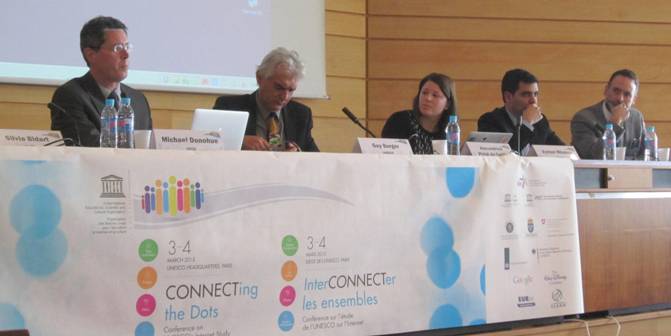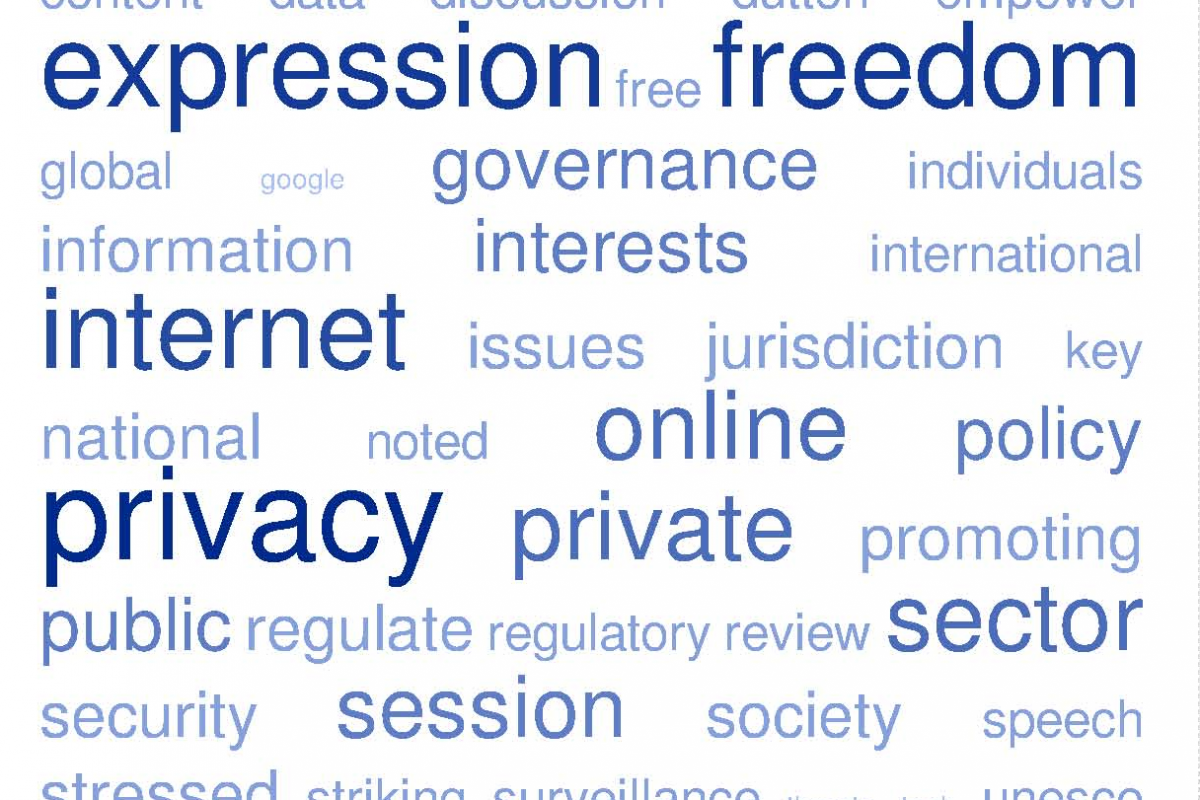By Juliet Nanfuka |
The United Nations Educational, Scientific and Cultural Organisation (UNESCO) in March 2015 published a draft study on internet-related issues that have the potential to advance online inclusivity. The study, titled ‘Keystones to Foster Inclusive Knowledge Societies’, explores how access to information and knowledge, freedom of expression, ethics and privacy are shaping use of the internet.
According to the study, balanced access to information and knowledge is hampered by filters on content, gender inequality, and limited access to technical tools and infrastructure required to obtain such information.
Meanwhile, freedom of expression globally is hindered by content filtering, regulation and in some instances severe criminalisation of online expression. Closely related to restrictions on online expression was the limited respect for the rights to privacy and data protection as fundamental online rights. The ethics of the internet, including ways through which it can be used to advance respect for cultural and other diversities, were also interrogated in the study.
The report calls for increased media and information literacy; balancing policies and practices on the conflict between freedom of expression and privacy; and reconciling global frameworks for addressing extra-territorial impacts of national censorship.
The study was based upon the crosscutting themes of UNESCO’s ROAM concept which incorporates a Rights based, Open Internet, which is Accessible to all and encompasses Multi-stakeholder participation.
The findings were discussed by representatives from civil society, academia, governments, the private sector, the technical community and inter-governmental entities at a meeting hosted at the UNESCO headquarters in Paris.
Speaking at the meeting, Alexandrine Pirlot de Corbion, Advocacy Officer at Privacy International, said the right to anonymity should be prioritised. This sentiment was echoed at the African Internet Rights Meeting which also took place in March in Accra, Ghana where anonymity was raised as an important right to promote citizen participation, transparency, access to information and freedom of expression.
In East Africa, recent developments reflect mixed attitudes on online rights. Some clauses that curtail free press in Burundi have recently been invalidated, while Uganda is currently reviewing stakeholder input to a Data Protection and Privacy Bill. Rwanda, often accused of suppressing free expression, is reported as having the most affordable internet in the developing world, according to the Alliance for Affordable Internet.
Tanzania has recently presented to Parliament an Access of Information Bill and a Media Services Bill, and enacted a Cyber Crimes Act, criticised for negating freedom of expression and privacy, and giving excessive powers to law enforcement agencies.
Kenya has in recent months been plagued with reports of putting a chill on freedom of expression online. Particular focus has been on the Security Laws (Amendment) Act, 2014, which provides for surveillance and interception of communications by intelligence forces with limited judicial oversight. The law was enacted as a means of combating terrorism in the country. Ironically, in 2014, Freedom House listed Kenya as one of only two African countries with internet and digital media freedom.
Indeed, as pointed out by Ayman Mhanna, Executive Director at the SKeyes Center for Media and Cultural Freedom during the March discussion of the UNESCO report, surveillance has been given legitimacy in regions of conflict and has also contributed to censorship of the media. He cited Lebanon where bloggers have faced punitive actions for comments posted online about public officials. The Middle Eastern country relies on a print media law dating back to 1962 – similar to Tanzania where outdated laws such as the Newspaper Act of 1976 are used to prosecute internet users including the media.
“There is need for more efforts to instill trust in privacy, security, and the authenticity of information and knowledge accessible online, and to protect the safety and dignity of journalists, social media users, and those imparting information and opinion in the online world,” states the UNESCO report.
The launch of the UNESCO study comes at a time when many countries across the world are still trying to address development challenges such as access to clean water, education and health. In many cases, ICT access has not received as much financial investment or political will to effectively drive its use particularly as a tool for good governance.
The study further encourages ethical reflection, research and public dialogue on the implications of new and emerging technologies and their potential social impacts by all governments particularly those in the developing world. Also at the Paris meeting, Anriette Esterhuysen, Executive Director of the Association for Progressive Communications (APC), called for inclusion of more civil society voices in internet governance processes to maintain a fair representation of the diversity of internet users globally.
With a series of other recommendations made in the Paris meeting outcome document, the extent to which they shall shape the internet policy debate will be the ultimate measure of success for this study.
Responses to the study will be consolidated into a report to be presented at the General Conference in November 2015. Addition information can be found here
Balancing Freedom of Expression And Privacy
Striking a balance between freedom of expression and privacy on the internet was the focus of a panel discussion at a review of one decade after the World Summit of the Information Society (WSIS). The WSIS+10 Review meeting took place at the UNESCO headquarters in Paris, France, February 25-27, 2013.
What convergences and tensions exist between freedom of expression and privacy online? What are the implications of approaching the balance between free expression and privacy from a freedom of expression–centric point of view? What actions can governments, civil society, media and the private sector take to balance privacy with freedom of expression online? And what is the best way to empower users? These are some of the questions addressed at the session on ‘Promoting of Freedom of Expression and Privacy Online’. CIPESA’s Lillian Nalwoga was the remote moderator for the session.
The session built on earlier discussions held at the 7th Internet Governance Forum (IGF) in Baku, Azerbaijan on promoting both freedom of expression and privacy on the internet. It also drew from the Global Survey of Internet Privacy and Freedom of Expression – a UNESCO 2012 publication – which highlights a diverse international regulatory landscape, and the challenges posed by discrepancies in laws pertaining to the online and off-line spheres, and between national and international jurisdictions.
During the session, Pranesh Prakash from the India-based Center for Internet Society stressed the need for more relaxed regulations to govern the conduct of the private sector. He noted that “one must give the private sector enough leeway to safeguard them from responsibility for users’ actions and the requirement of taking down reasonable speech.” However, he added that the commercial sector has divergent interests and they do not necessarily align with public interests.
According to him, differing public and private sector interests coupled with unenforceability of self-regulation mechanisms and the jurisdictional issues of the internet mean that the conflict between freedom of expression and privacy cannot be easily resolved through public policy options that are only aimed at the private sector.
Patrick Ryan, a Policy Counsel from Google who was also a panelist, argued that the move to the “cloud” brings with it both enhanced privacy and security benefits, while at the same time putting data potentially at risk. Noting that government surveillance remained one of the biggest threats to privacy, he stressed that the private sector needs to share more information on government take down requests that violate individuals’ privacy and free speech.
Meanwhile, William Dutton, a professor of Internet Studies at Oxford Internet Institute, stressed the importance of recognising the power of the internet in empowering networked individuals and enabling freedom of expression, like never before. He cautioned that if nations do not approach the issue of striking a balance between freedom of expression and privacy appropriately, some of the key benefits of the internet may be lost. He noted that whilst some nations have taken progressive steps, many others are moving in the wrong direction and various global policy choices are increasingly restricting freedom of expression.
Indeed, this has been illustrated by worldwide trends towards more content filtering and censorship. Dutton said adopting inappropriate models for internet governance and regulation, such as disproportionate levels of surveillance in the name of security, reliance on intermediaries to regulate content, and assertion of national sovereignty and jurisdiction in the online world are threatening privacy and freedom of expression.
Key recommendations from this session were: avoiding a moral panic over privacy; creating widespread awareness of issues concerning privacy and data protection among users especially the young generation; updating policy and regulatory frameworks that address freedom of expression and privacy online; and having a clear definition on national security interests.
For more information, please visit – https://www.unesco-ci.org/cmscore/events
Promoting of Freedom of Expression and Privacy Online
Follow WSIS+10 on twitter at #WSIS


